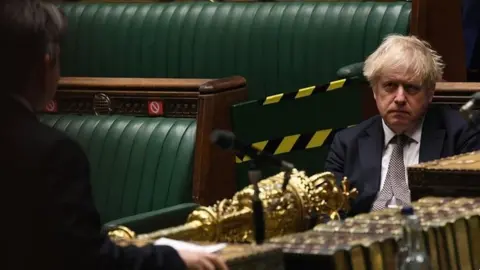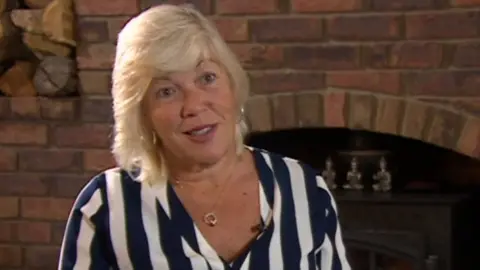The week ahead in Parliament

 EPA
EPAAre we about to see the first real parliamentary crisis of the pandemic?
New regulations creating the revised tier system in England and the loosening for Christmas are due before Parliament on Tuesday - and real trouble is clearly brewing on the Tory backbenches.
A dangerous number of normally loyal backbenchers are threatening rebellion, in terms which make it hard for them to climb down without some real government concessions, perhaps on parliamentary oversight of the restrictions, or on trying to localise them with greater precision.
It's worth noting the arithmetic here: it would normally take a rebellion of around 40 Conservatives to cancel out the government's majority.
But on this issue the 47 SNP MPs would not normally vote, which gives the government a more comfortable margin. And in any event Labour will probably support the restrictions, after extracting a price.
So it's not the prospect of defeat, so much as the corrosive impact of having to rely on Labour to get the regulations through that is the problem for ministers.
And the increasingly sharp tone of the government's Conservative critics is striking; a big Conservative vote against these regulations will create dangerous new fault-lines. And that's before we get on to the possibility of some kind of outcome to the post-Brexit trade talks with the EU, which may re-expose some old fault-lines.
Elsewhere, here are a few more Westminster sub-plots to watch out for:
- Cutting the aid budget.... may be possible for this year under the law which mandates that the UK spends 0.7% of national income on overseas aid, but cutting for several years in a row will require an annual explanation to Parliament, which will become a kind of annual penance. So will the government seek to change the law? That's awkward in the Commons, where senior Conservative figures (Andrew Mitchell, Tom Tugendhat, Tobias Ellwood, among others) are strongly opposed; more difficult, still, in the Lords, where opponents will be able to say they're holding the government to its election commitments.
- Lords a-lashing: the government has been having a very rough time in the Upper House. This week saw peers inflict their 53rd defeat on ministers - and while they usually back down if the majority in the Commons rejects their changes to legislation, the constant need to refight often painful battles is doubtless a constant irritant to the government. And a major clash looms on the UK Internal Market Bill (see below) so listen out for threatening rumbles - although at the moment the government must surely be too busy with more pressing matters to contemplate a stab at the kind of comprehensive Lords reform that has eluded every prime minister since Asquith.
- Virtual Stalemate 2: this week's fiasco in which the government sought but failed to get a limited rule change through the Commons to allow certified clinically vulnerable MPs to participate in all debates means that the likes of former minister Tracy Crouch (who's being treated for breast cancer) still can't take part as they would wish. The change was "talked out" by MPs who argued it did not go far enough and want a much looser system, allowing those who are shielding family members as well as those who're vulnerable themselves to take part in all proceedings. It will be interesting to see if such a debate appears. Certainly, behind the scenes, senior MPs are lobbying furiously, because they believe too many colleagues are being disenfranchised by the current rules.
- Unfixing terms: having twice driven a coach and horses through the coalition-era requirement that general elections should be five years apart, with the early elections of 2017 and 2019, it's rumoured that the government's about to publish a draft bill to repeal Nick Clegg's Fixed Term Parliament Act, thereby providing a bonanza for constitutional scholars and procedural hair-splitters. Can they reconstruct the Royal Prerogative? How long should a Parliament last? Will prime ministers once more have the power to spring a snap election on a slumbering opposition? All this and more will be fought out in a new joint parliamentary committee under former Conservative Chief Whip, Lord McLoughlin. Anoraks will be worn.
- The final frontier: some intriguing questions about the PM's ambitions to launch rockets into space from Scotland are raised by a House of Lords Committee report on the unusual agreement struck between the US and the UK to "preclude unauthorized access to or transfer of US-origin technologies associated with the launching from UK spaceports". With 42,000 people working in the UK space sector, ministers sense important commercial opportunities, but to seize them they have signed up to some stringent demands from Washington. Segregated areas will be jointly designated by the UK and the US for the handling of US launch vehicles, spacecraft, related equipment and technical data. And once an area is designated, "access is to be permitted only to persons authorised by the US and will be controlled by the US government". Labour's Lord Collins of Highbury is now asking for a debate to shed some light. Sensors to full power!
Here's my rundown of the week ahead:
Monday 30 November
The Commons opens (14:30) with an hour of Work and Pensions Questions. And that's usually followed by ministerial statements and Urgent Questions.
The main legislation is the Telecommunications (Security) Bill, which seeks to create a stronger telecoms security framework for the era of 5G and the increasingly pervasive digital networks it will enable.
The Bill will also introduce new national security powers for the government to manage risks posed by "high-risk vendors" - clauses aimed at the Chinese 5G provider, Huawei.
In Westminster Hall there are two debates scheduled by the Petitions Committee.

Firstly (at 16:30) is e-petition 255823, which calls for a full public inquiry into the death in a mental health facility of 20 year-old Matthew Leahy. The petition, started by Matthew's mother, says "something went terribly wrong with the NHS mental health services provided to my son".
Matthew, it says, was taken to "a place of safety" and died seven days later. The petition, which attracted more than 105,000 signatures, says 24 other people have died in similar circumstances since 2000.
In response, the government expressed sincere regrets over Matthew's death; NHS Improvement will review the care he and others received and will provide advice in due course on whether a public inquiry should be held.
That is followed (at 18:00) by a shorter debate on e-petition 331453 entitled "Scrap removal of free transport for under-18s from TfL bailout" The petition argues that destroying free travel would hurt many teenagers, and it has attracted 170,649 signatures.
On the Committee Corridor, Public Accounts (14:30) takes evidence on one of its hardy perennial subjects - lessons from major projects and programmes - from Nick Smallwood, the Chief Executive of the Infrastructure and Projects Authority.
In the Lords (13:00) questions range across private investment in the hydrogen sector, and the case for convening a summit of the governments of the 10 leading democracies in spring 2021.
The main legislative action is the Report Stage consideration of the High Speed Rail (West Midlands-Crewe) Bill - where the architect of HS2, and former Transport Secretary, Lord Adonis, will seek to safeguard the next stages of the project, with an amendment requiring the current Transport Secretary to lay plans for the line from the West Midlands to Sheffield and Leeds before Parliament within six months of the Bill being passed into law.
There is also a motion to defer the Report Stage and refer some issues to a special committee - but this is thought unlikely to be pushed to a vote.
Tuesday 1 December
The Commons opens (at 11:30) with Treasury Questions.
There's then an interesting Ten Minute Rule Bill on apologies, from the Conservative John Howell.
He's Chair of the All-Party Parliamentary Group on Dispute Resolution, and he wants the UK to follow the example of other countries which allow apologies to be made for, for example, mistakes in treatment in a hospital, without this counting as an admission of liability, which can be used in court.
That is followed by the week's major event - the debate on the regulations which will underpin the new three-tier system for coronavirus restrictions in England, and the loosening proposed for the Christmas holiday.
These will be orders made under the Public Health (Control of Disease) Act 1984 and, unusually, they will be debated in the House of Lords at more or less the same time, in order to get them into law by Wednesday.
In Westminster Hall (at 09:30) the DUP's Jim Shannon leads a debate on raising awareness of signs and symptoms of cancer in teenage and young adults, and the Conservative Claire Coutinho has a debate on proposals to designate land as wild belt areas (14:30).
Offstage, there's a considerable helping of select committee action: The Treasury Committee (09:30) takes evidence on the latest Spending Review, and will hear from Richard Hughes, Chair of the Office for Budget Responsibility and supporting cast; a session with economists follows on Wednesday.
Public Administration and Constitutional Affairs (09:30) questions the Chair of the Committee on Standards in Public Life Lord Evans of Weardale. I daresay the subject of the home secretary might come up.
Health and Social Care and Science and Technology (09:30) continue their fascinating series of hearings on Coronavirus: lessons learnt, with a look at the impact of Covid on people from Black, Asian and Minority Ethnic backgrounds as well as people with learning disabilities, who are estimated to have a death rate of four times higher than average.
Business, Energy and Industrial Strategy (10:30) have a hearing on the government's preparations for the COP-26 climate conference and on efforts to achieve net-zero.
In the Lords (12:00) questions have a World AIDS Day theme, with Baroness Barker asking about ending HIV transmissions by 2030 and Lord Cashman asking about the impact of pre-exposure prophylaxis (PREP) on new HIV transmissions.
There's also a question on support for older people at risk from domestic abuse during the pandemic
Then, peers move on to day two of committee stage consideration of the Covert Human Intelligence Sources (Criminal Conduct) Bill. This, remember, is the probing stage of scrutiny, and there are unlikely to be any votes.
But the issues in play include different levels of oversight, plus calls for assurances that trade union activity can't be affected by the powers under the Bill.
This is followed by a four-hour debate on the new Coronavirus restrictions - the same as those before the Commons. It's almost unheard of for peers to reject regulations, but someone might well put down a "regret motion".
Wednesday 2 December
Commons business opens (at 11:30) with half an hour of Northern Ireland questions, followed by Prime Minister's Question Time.
The day's Ten Minute Rule Bill, proposed by the DUP's Jim Jim Shannon, is on providing Automated External Defibrillators.
Then MPs consider a batch of mostly Brexit-related regulations.
In Westminster Hall subjects for debate include: access to cancer diagnosis and treatment during the pandemic (09:30) and homelessness and temporary accommodation (14:30).
Again, there's plenty of committee action. The Treasury Committee (14:30) continues its scrutiny of the Spending Review with a panel of economists including Paul Johnson of the Institute for Fiscal Studies
Environmental Audit (14:30) will hold its final session on the Energy Efficiency of Existing Homes, quizzing Ministers Kwasi Kwarteng, Christopher Pincher and Kemi Badenoch.
 PA Media
PA MediaWomen and Equalities (14:30 )have witnesses from L'Oréal Paris, Dove, Boohoo, Sport England, the Advertising Standards Authority and Transport for London for a session in their inquiry into body image
In the Lords (12:00) questions cover support for the operation of Belfast International Airport, protection for children groomed into filming their own abuse online and the future of European security cooperation
Then, having extensively rewritten it, peers will zip through the Third Reading of the United Kingdom Internal Market Bill.
It will then ping back to the Commons for what could prove to be an extensive bout of parliamentary ping pong. The government was defeated seven times on key aspects of the Bill, most notably the crushing Committee Stage vote, where the controversial law-breaking powers were struck out by a majority of 268 votes.
Unless a deal with the EU gets everyone off the hook, it may well be that the Lords refuses to budge, even if the government majority in the Commons reverses the changes they have made.
The result may be that ping pong, appearing on the agenda as Lords "consideration of Commons Reasons" and Commons "consideration of Lords Amendments" may become a daily, even hourly event in the run up to the end of the Brexit transition period, and perhaps beyond.
Thursday 3 December
MPs begin their day (at 09:30) with Transport Questions, followed by the weekly Commons Business Statement from the Leader of the House.
The main business is two debates chosen by the Backbench Business Committee - first on the future of coal in the UK, then on digital infrastructure, connectivity and accessibility.
In Westminster Hall (13:30) there are more backbench debates, firstly on access to and acceptance of cash during the Covid outbreak led by former ministers Paul Maynard and David Mundell.
The second debate (15:00) is on the future of nurseries and early years settings, focusing on the problems flowing from the policy of providing 30 hours of funded childcare for three and four-year olds - which has led to many providers struggling to remain financially sustainable.
The financial challenge has been starkly highlighted by the pandemic, leaving 25% of providers facing permanent closure within the year. The sponsors of the debate, Tories Steve Brine and Theresa Villiers and Labour's Jack Dromey, want the system overhauled.
The day's committee action sees Public Accounts (10:00) quizzing Tamara Finkelstein, the Permanent Secretary at the Department for Environment, Food and Rural Affairs on the government's long-term environmental goals.
And Environment, Food and Rural Affairs (11:00) holds the final evidence session in its inquiry into flooding in England. starring Environment Secretary George Eustice and Housing Minister Lord Greenhalgh.
In the Lords (12:00) question time includes the historian Lord Lexden asking about the review of the National Trust Acts, and there will also be questions on National Planning Policy Statements, the Paris Climate Agreement and on access to Child Trust Funds by children with learning disabilities
Then peers move on to day three of committee scrutiny of the Covert Human Intelligence Sources (Criminal Conduct) Bill.
They will discuss limiting the types of crimes that can be authorised under the bill, and protections for children and vulnerable people.
Neither House is due to sit on Friday.
